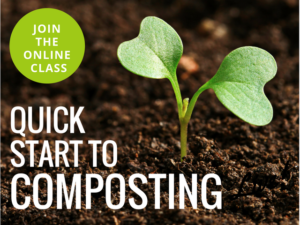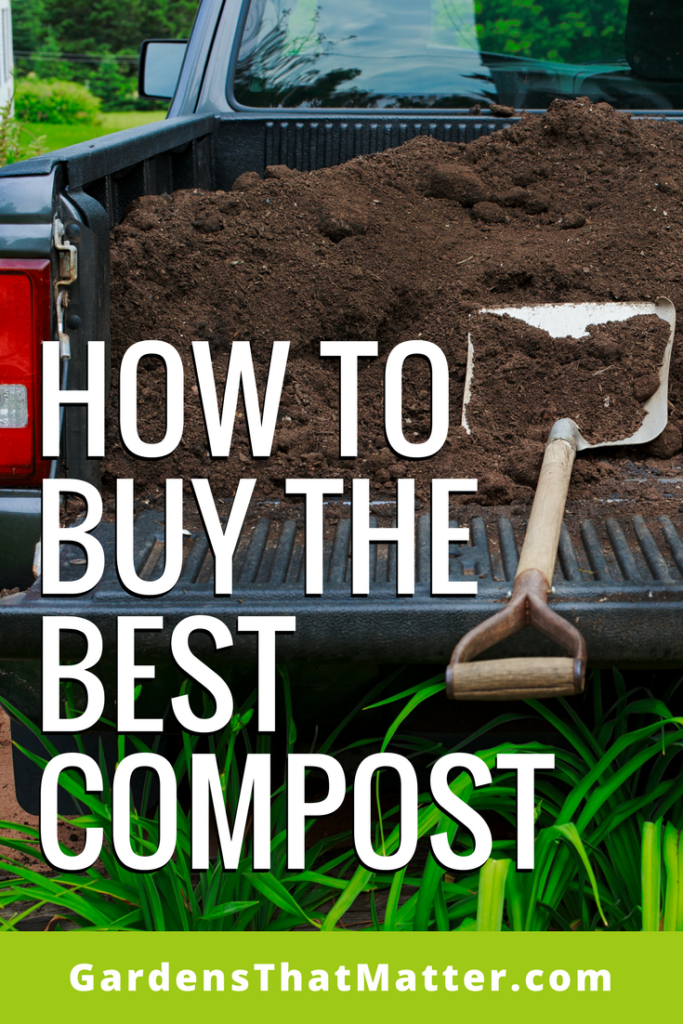Buying Compost? Be Sure You Can Say YES! to These 4 Questions…
Spring time…planting time…need-more-compost time! Let’s talk about what to look for and ask about when you buy compost.
(If you’re already making plenty of your OWN compost, skip this article and get started on your plans for the day!)
First, you need to know this: all that decays is not black gold. Commercial compost can vary widely from the vibrant, well-made stuff of garden miracles to dead, dusty, and toxin-laden killer compost.
How do you make sure you’re getting the good stuff? Ask yourself these 4 questions:
1. Do you know (or could you know) WHO made the compost?
If not, find a local composting facility. You’ll be able to visit (see #4) and at the same time, your dollars stay in your region. If you buy in bulk, you’ll be save some of those dollars, too! You’ll also be supporting the sustainable, regenerative work of a neighbor in exchange for compost. Win-win.
2. Have you asked other gardeners about your compost maker and/or checked online for reviews?
If not, ask around. Talk to gardening friends, neighborhood nurseries/garden shops, garden clubs, or farmers. You could even ask the supplier for a few references. Find at least 2 people who’ve used the compost with good results. You’ll be eating from and walking barefoot in the garden where you put this compost.
3. Does your compost maker ensure ingredients, a.k.a. feedstock or source materials, are free of persistent herbicides and other toxic gick?
“Killer compost” may sound far-fetched. Attack of the Killer Tomatoes, anyone? But this is very, very real problem.
Persistent herbicides used by hay and grain farmers don’t break down during digestion or decomposition. Affected manures, hay, and straw carry these herbicides into the compost you carry into the garden. Tomatoes (and other nightshades) and beans (and other legumes) are hard hit by persistent herbicides. If you bring killer compost into your garden, you’ll have to wait several years before the toxins finally break down. Not good news for your homemade tomato sauce or green bean casserole.
Another potential source of toxins is biosolid waste. While responsible recycling of our sewage is important, do you really want your vegetable garden to be part of that process? Biosolids can be high in salts, heavy metals, antibiotic-resistant bacteria, and toxic chemicals. They can’t be used on Certified Organic gardens. Consider the options carefully before you use them on yours.
4. Does the compost look, smell, and feel finished and alive?
Since you’ve chosen a local compost supplier, you can go to the site (or store) and pick up a big handful of the compost. Look closely, take a whiff, squeeze it in your hand. Don’t taste it…it’s compost. 😋
You’re looking for dark colored, earthy smelling, cool, damp material with a uniform consistency. No slime or chunks to hint at what the original ingredients were.
If the compost is warm to the touch or if it smells like sulfur, ammonia, or other funk, say no thanks. Heat and “off” smells are signs that the composting process is unfinished and out of balance.
You want to buy compost with enough water to support the soil life but not enough to make it super heavy. Compost facilities usually dry finished compost some to avoid hauling around extra water. A tight squeeze might give you a drop of liquid or leave an easily-broken ball in your hand.
Dusty compost? Be careful…dry compost isn’t going to have many living organisms in it. Plus, it is a pain to re-wet. You’ll have to water it down and mix it multiple times before spreading it.
Oh, and if the compost is packaged in non-breathable plastic bags, no go. The soil life we want to bring to our gardens via compost can’t live without oxygen.
Perhaps you answered yes to all four questions and you’ve struck it rich, in the soil amendment sense.
However, if you’re struggling to get yes-yes-yes-yes, do the best you can for now. AND make plans to start your own compost ASAP.
 We’d love to help you do just that.
We’d love to help you do just that.
You can subscribe to Gardens That Matter and get a free preview of the Quick Start to Composting class.
In class, I go over what you need to know to get compost going and show you my favorite method. The three-part video class is available now.
You can read more and sign up here: www.gardensthatmatter.com/workshop/
Now, I’d love to hear from you. Have you learned from bad compost buying experiences? What other tips do you have for someone who’s getting ready to buy compost? Tell me in the comments below!

